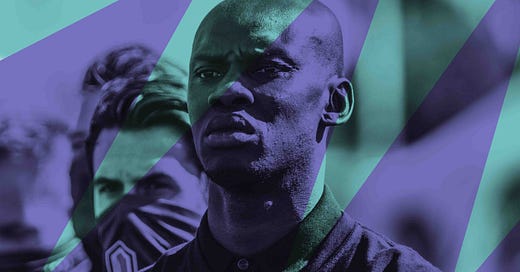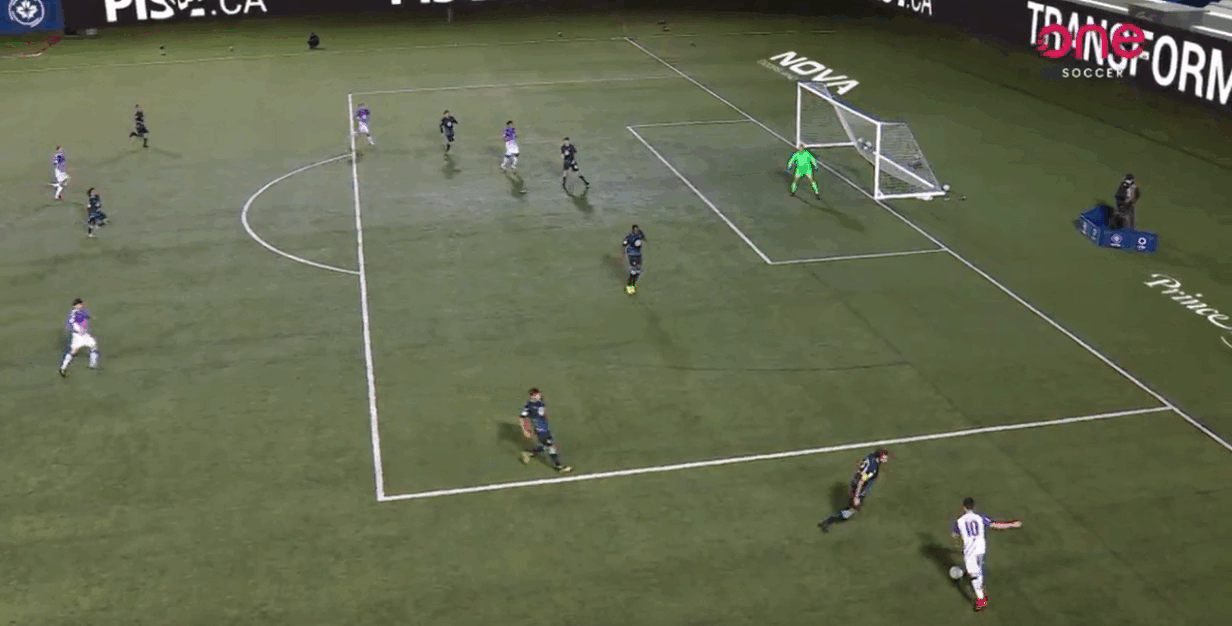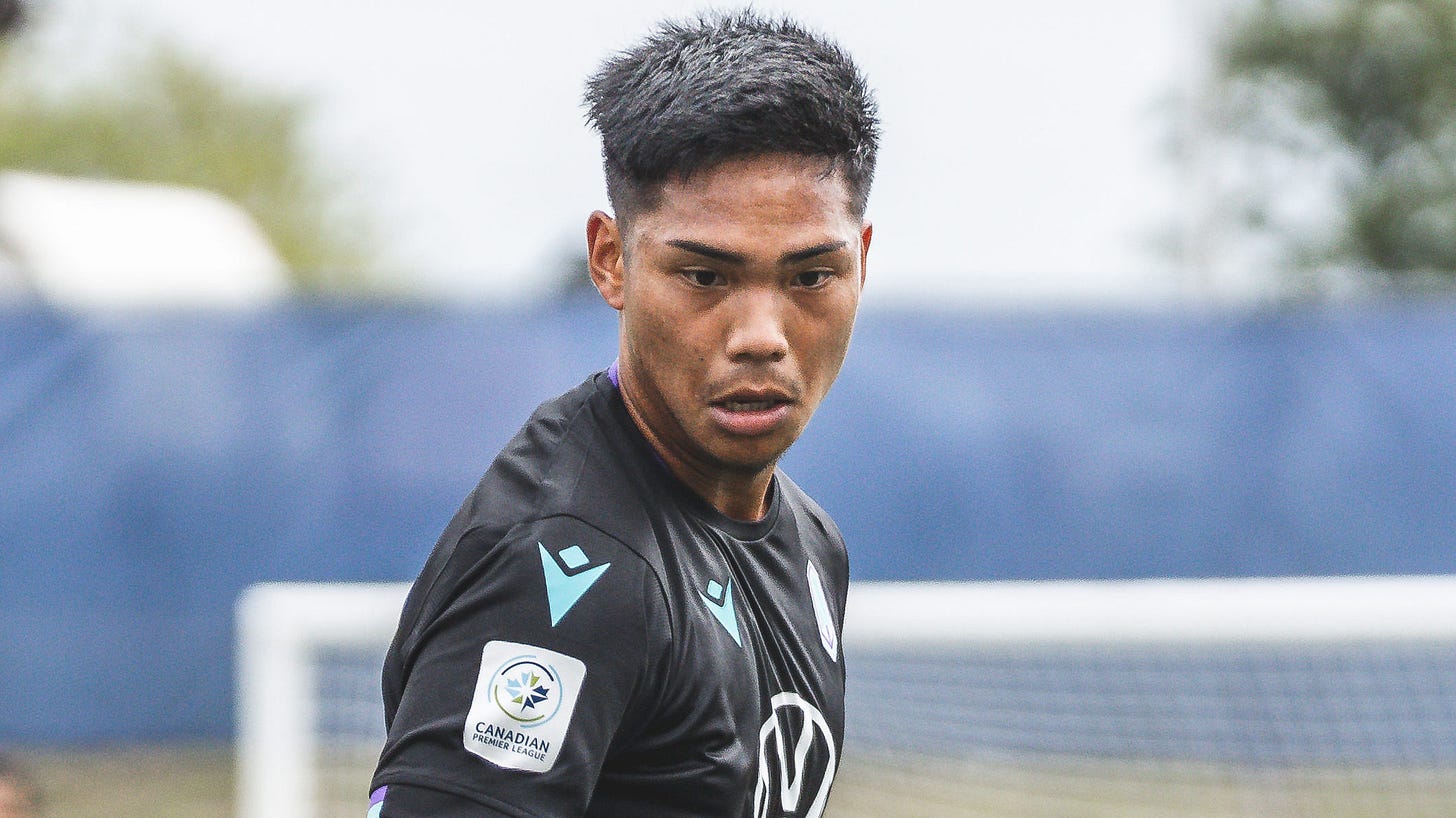'Trust the process': One-on-one with Pacific FC head coach Pa-Modou Kah
Pacific's second-year bench boss talks expectations for 2021, "trusting the process," and getting the most out of his club's new additions

Pa-Modou Kah does not lack for confidence. A former assistant coach with FC Cincinnati, Kah joined a young Pacific club in 2020 looking for direction. In Kah, the fiery Gambian-Norwegian defender who’d spent nearly twenty years between Norway, Sweden, Qatar, Saudi Arabia, and the MLS, PFC found not only its head coach and tactician, but the club’s emotional engine—a seasoned defender and impassioned leader who could motivate a squad in need of a little fire in its belly.
The honeymoon season is over. Kah’s arrival led to improvements—a top-four finish and MVP-caliber season from Marco Bustos among them—but other questions remain: how much better can this club become? Can Pacific’s young players reach their potential and put old mistakes to rest?
“For us, there will be a different version going into this year,” says Kah.
As the 2021 season looms, I spoke with Pacific’s head coach about lessons learned from the Island Games, “trusting the process,” and getting the most out of his club’s new additions.
This interview has been lightly condensed for clarity.
You’ve had opportunity by now to look back and rewatch Pacific’s performance at the Island Games: a strong season, clinching the playoffs and a top-four finish, but still showing areas in need of polish. When you look back at the tape, what do you see? What takes priority when it comes to building on last season?
PMK: I mean, for us, the priority is to keep on building on what we’ve built. Me and my coaching staff, James Merriman, Riley O’Neill, Mark Village, we set out with a vision of who we wanted to be, what type of football we wanted to play: to be a dominant, ball possession team. And attacking. To start off, that’s what we preached: we preached the process, because we know things take time to play a certain style of football. And it requires certain types of players, also, to fit into your system—and the buy-in of the players.
We had a slogan; it was “trust the process,” built off the first year where the boys were young and not quite into the professional realm. We wanted to bring in a more demanding professional environment with high expectations, high standards, because [of] the quality of the players. Then COVID hit, and that means you had to re-evaluate certain things, but we just kept [on], sending individual training plans [to our players], and once we could resume, we focused in the units to reinforce the things we wanted to see as a team, the things we wanted the players to develop.
So we took our time, really, last year—which was a blessing, because normally, you don’t have that much time as a coach to hammer in your philosophy, because that is built through repetition. But we were able to gain a little more because of [the impacted schedule], and also truly, truly dive into how we wanted to play, through Zoom calls and unit work. And they’re a group that wants to improve, wants to get better, so for us as a coaching staff, it makes the job much easier when you have a group that is so connected, that is willing to go above and beyond to get better.
“I know a lot of people were thinking, ‘Oh, we only brought seventeen, eighteen players,’ … You’d rather have quality than quantity, every time.”
Going into the Island Games, I know a lot of people were thinking, “Oh, we only brought seventeen, eighteen players,” but because we had so much faith in them, the way that we worked with them, we knew it’s not the size [of the roster]. You’d rather have quality than quantity, every time. And we knew that we’d spent time with these players; they understood what we’re asking of them. They trained themselves; they were fit. So for us, it was a no-brainer.
They took a huge step, which is to their credit—because as a coach, you’re as good as your players. For us to see that kind of improvement from the year before, the maturity they showed, was fantastic. You had players like Marcel [de Jong]; players like Jamar [Dixon] in the midfield; Baldi; [Terran Campbell] was physical; Jordan Haynes, who came in and brought a little grit; Abdou [Samake]; Thomas Meilleur-Giguère; Callum Irving; Marco Bustos [performing well]. Those things were very important to us. And also how people fit with one another inside a group, because the group dynamic is something, me being a player for twenty years, it’s very important. And to see that with the boys is fantastic.
One thing we saw with Pacific last season was a tendency to concede late-game goals. You look at the late penalty against the Wanderers that saw a win turn to a draw, the 2-1 loss to Forge that came in the 97th minute, the 1-0 loss to Ottawa that scuppered a draw. What did you see in those matches, and how do you fix that?
PMK: Those are a little bit of [a] concentration lapse, which can happen—especially the penalties, because in ten games, we gave away six penalties. That’s five penalties too [many]. And those are the learnings and improvements we want to see going back, looking at the Island Games and going, “alright, how can we improve?”
Those [late goals], for me, it has nothing to do with technical [ability]; those were just concentration lapses. But the boys know that we know it, and we’re rectifying it. So I’m not worried about that; it was in the past. We’ve got to do better, obviously. We spoke about it, and they agreed, and they take it to heart—which is what you want professionals to do.
So for us, there will be a different version going into this year. But is it something to worry about? Nah. Given the circumstances of how the season [played] out, and not playing many games, those things tend to happen—but we will definitely rectify it.
You’ve mentioned the style of play you’ve looked to implement with the coaching staff: a possession-oriented style, building from the back. No club had more touches in the defensive third per game than Pacific—and by a decent margin, too. But it also extended to passing and where those passes went. Only FC Edmonton had a lower share of their passes going upfield.1 How do you create more opportunities for being aggressive up the pitch, or is that simply a product of a possession-focused game?

PMK: I mean, overall, if you look at our percentage of passing forward, playing forward, sometimes you’ve got to start somewhere, and for us, it was with the basics: how do we keep possession, and how do we keep possession in the middle third and the final third? And that’s a work in progress; it’s not going to happen overnight. We know it; the players know it.
For us, we analyzed the Island Games, and we analyzed, “alright, we’ve built up our fair share of the [defensive third], now we progress it to the middle third, and then we’ll progress it to the final third.” That just happens over time. It’s not just going to happen in one day, one week.
“When you want to attack, it starts from the back. When you want to defend, it starts from the front. That’s the way we think about it.”
We have a process that’s going on, and we have a way of working that we believe in. And it will come. Those things will happen gradually. We cannot make one step and then think that we can [leap] three steps ahead. No, you have to build it step-by-step.
Football is the only place where you build a foundation [from the top]. Normally, when you build a foundation, it starts at the bottom, but in football, it starts at the top. But in this instance, the foundation of the game, you start at the back, then you build yourself up. Because when you want to attack, it starts from the back. When you want to defend, it starts from the front. That’s the way we think about it.
On the attacking front, all of Pacific’s goals at the Island Games came from within the 18-yard box.2 And you’re probably happy about that, because you’re getting higher percentage shots off—you’re more likely to score from within the box than if you’re shooting from long distance. But that being said, how do you create more chances from outside the box to keep opponents on their heels—or is that [shot selection] evidence of a system that’s working?

PMK: I mean, we want to have different ways of scoring goals, but we all know the high-percentage goals are scored inside the box. Simple as that. You can go and look at the games—if you want to score goals, you have to be inside the box. You take a shot from eighteen, nineteen, twenty, twenty-five yards, what are the odds you’re going to score? Slimmer. So you have to look: “Okay, what are the odds of scoring inside the five-yard box or inside the eighteen-yard box?”
But also, you have to utilize the quality of the players. Some players, their qualities are being inside the box. Why am I going to ask them to [attack from] outside the box? Take [Terran]. T has a terrific left foot. Díaz has a wonderful [finish]; he’s two-footed. Both of them are capable as strikers, but if you ask them, they will tell you, “give me the ball inside the box.” So it’s our job to do that.
Bustos can score outside the box. Victor Blasco can score outside the box. Ollie Bassett can score outside and inside the box. It’s just depending on how we set up and play, but they have the freedom—and if they decide to take a shot from twenty-five yards and score, well, be my guest. I’ll never tell players not to have that freedom. They have that freedom. Most important for me is getting into the areas that you need to [penetrate] to score. Because once you get there, the [odds] are that you’re going to score. We’d rather have high-percentage goal-scoring opportunities than low-percentage scoring opportunities.
One new addition to the club is Manny Aparicio. How do you implement him into the lineup?
PMK: Well, you know, he’s coming to a different style of play, to a different style of club. We know that he’s going to need a little bit of [an] adaptation phase, and he’s going through that. He’s doing well; he’s doing great, and he’s adapting to his teammates; his teammates are adapting to him. For him, it’s just being him—that is the most important thing. He’s a quality player; he’s somebody that has the capability to unlock [a] defense. Technically, he’s very good. Tactically, he’s good.
He loves the game, and also, he wants to win—and that’s the way we are as a club. We want players that are highly ambitious and have the will to win—and also leave a legacy behind. I think he’s doing well; he’s just got to continue what he’s doing. We know the quality that he has; he knows the quality that he has. And now he’s just gelling with the other players.
Obviously, there’s a lot of offensive firepower when you imagine him joining a midfield and attacking lineup with Marco Bustos, Alejandro Díaz, and Victor Blasco. But how do you manage that without stretching the defensive assignments too thin?
PMK: I mean, like I said, defending starts from the front. So if they do their defensive jobs well, then they don’t need to defend lower down [the pitch]. And they’re all intelligent players, so for me, I’m not worried about it. When we have the ball, the opposition cannot score [laughs]. Unless we give away the ball, the opposition cannot score. So [in] today’s football, you have to be able to do both sides—and you see it at the top level. Football players now are capable of doing both sides of the ball—which I know we are. We saw it last year, and this year is no different. Anybody that comes here, we make sure they understand our vision and philosophy, the way that we want to play. And we hammer it every single day that we train.
Matthew Baldisimo really seemed to come into his own last season. He played nearly every minute of the Island Games.3 Kadin Chung, too. What do you like about what you see in their games?
PMK: I’ve had the pleasure of knowing these two players, and some of these other players in the squad, from a very young age. I’ve seen their growth as players, and I think [until now], they haven’t had that constant development pathway so that they could continue their development. When Baldi was 16, 17, he could’ve been tested more at the Whitecaps [academy]. He wasn’t. Luckily, when they had [the] USL [affiliate], he could play games, and he could continue [his] development.
With Baldi, one of his strengths and weaknesses is his versatility. He can play different positions, so nobody ever put him in the [best single] position to focus and develop. But for me, I’ve always seen him as a [defensive midfielder]. Occasionally, as centre-back. But beyond that, I don’t see him playing what he’s been playing for the past couple of years: right-wing, right-back, left-forward, or whatever.
For players to actually showcase their qualities, they also need a defined role—and I think him as the No. 6, it’s made for him. Because he’s a very good technical player, and also, he has fight in him. He’s aggressive when it comes to defending on the front foot—and I think he can control the game at that role for us. And last year, I think he came into his own, because he could focus on one position; he didn’t need to think, “tomorrow, maybe the coach will put me in a different position.”
And Kadin is the same. I’ve known Kadin since he was young. He’s always possessed great qualities—and it’s the same as [Baldisimo]: he’s never been pushed to get a little bit out of his comfort zone. And I think once he does that, people will clearly see his quality.
I call him Mr. Effortless, because that’s how it seems. He puts in the work, but to others, it may seem [otherwise], because that’s just how he is: he’s so quick, and he’s so technical; he’s just going about his business unnoticed. Nine out of ten coaches who don’t know him [probably think], “he’s not showing emotion, he doesn’t care,” but he does care. He loves this game of football. But what he does is just effortless—and you don’t become effortless if you don’t work on your craft. But we challenge him, because we believe he possesses more ability and potential.
He and Baldi should’ve been part of this U-23 squad, if you ask me—together with Thomas [Meilleur-Giguère]. If you look at young players, I think Kadin deserved it because of what he showed at the Island Games. Baldi as well. But now Baldi, another door opens where he can hopefully make his debut for the Philippines national team playing in World Cup and Asian Cup qualifiers—which nobody is doing in the CPL. And that says a lot about what we’re trying to do here as a club.
Another addition to the club is Matteo Polisi, coming from Simon Fraser University. What have you seen from him so far?
PMK: We’ve seen a lot of progress with Matteo. Obviously, when you come from the college game, it’s always different to when you enter a professional environment. It requires adaptation. But he’s done exceptionally well. He came in last year with us, practised, and he was very good in training. And that helped him get a contract. But also, he has a desire to get better, and every day, he’s looking to get better—which is great.
What expectations do you have for Jamar Dixon, in his second year and now wearing the captain’s armband?
PMK: Same as last year: be the fearless leader who you know will be there for his players. Be that rock for the boys when they need somebody to talk to. Be the voice for the players on and off the pitch. Lead—which he does—by example. I think he’s going to play a huge, huge role for us. Same as last year, because he was very important in that midfield, together with Baldi and Sean Young as well, who also showcased his quality. Jamar is my voice on the pitch.
FC Edmonton played 36.1% of their passes forward in 2020, compared to 36.8% for Pacific FC. HFX Wanderers FC led all clubs in percentage of passes played forward, with 42.3%.
Pacific FC had just six shots on target from outside the box all tournament. By contrast, Cavalry FC and HFX Wanderers FC had 11 apiece. Valour FC led all clubs with 12.
Baldisimo: 10 starts, 875 minutes.







Another banger Martin. I feel like there are a few clues in Kah’s words about who might be a starter and who won’t...
Thanks for this. I really appreciate the in depth questions about players and tactics. Most footy articles’ just scratch the surface.